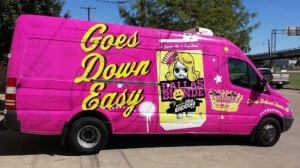
Well, not even sex necessarily. It’s objectification and misogyny that seem to get people riled up. Recently, Deep Ellum Brewing Co., of Dallas, Texas, took some serious flak for a slogan some felt perpetuated rape culture. The company posted a picture to Facebook of a pink van, decorated with a can of its Dallas Blonde Ale next to the words, “Goes Down Easy.”
John Reardon, the brewery’s founder, explained in a blog post on the company’s website that it was simply meant as a double entendre. This beer goes down smooth and here’s a joke about fellatio.
People got mad and the story made its way to the front page of Fox News. After Deep Ellum’s hiccup was likened to a similar (at least in vocabulary) ad to one run by Belvedere Vodka, Reardon conceded in his blog post that that was, indeed, over the line.
So where is the line that can’t be crossed in branding?
“I don’t know, I mean, how do I decide?” Reardon told Brewbound. “Some people can dive in and be offended by anything.”
Adding that the overall response to the slogan was overwhelmingly positive, Reardon said the whole story stemmed from a vocal minority. With opinion split, it’s certainly difficult to draw a definitive line.
Though is such a line even necessary? At what point is creating controversy avoidable simply by asking oneself, “Would I talk to my mother with this mouth?”
“I think it just needs to be respectful,” said Rebecca Millette, of Girls Pint Out, a national craft beer organization for women, speaking of brands in general. “I get it, I also have a mouth like a sailor, but it isn’t just your buddies seeing these ads.”
Ginger Johnson, founder of Women Enjoying Beer (WEB), added that it’s just poor planning for breweries not consider the feelings of potential consumers.
“I think it has to do with having a marketing plan, period,” she said.
“They’re really being foolish by not looking at that as an essential part. If they miss that, they really shouldn’t be in business if I’m going to be blunt about it.”
Deep Ellum is hardly the first brewery to find itself on the receiving end of criticism over this type of stuff, and the Dallas Blonde is far from the most egregious offender in its category. Nor does this article make for the first bit of digital ink spilled on the subject.
Melissa Cole, a beer writer, asked in an open letter to breweries about women and branding, “how can a successful and genuinely good brewery not see how appalling cheap, nasty and tacky it looks against the rest of the brands?”
Elsewhere on the web, it’s been said plainly, “Beer is sexy, but is it also sexist?” going on to cite brews by heavy hitters like Lagunitas as well as much smaller companies like The Tap Brewing Co. as offenders.
If beer, per se, is sexist, consumers don’t seem to mind.
A recent survey conducted by Consumer Edge found that beer is losing favor among men in the “favorite alcoholic drink” category, but gaining steam among women. Of the women surveyed, 26 percent cited beer as their favorite libation against 24 percent last year. Seen next to Girls Pint Out sprouting 23 new chapters in the country over three years, the numbers seem plausibly representative of increased interest in beer amongst women.
As Johnson of WEB puts it, it’s about “knowing who your market is, knowing who you want to pursue as a segment.”
She added that companies must be cognizant of the marketplace if people want to see their brand avoid being a mere “flash in the pan.”
In the distributing world, this type of branding could also have a severe impact on a brewery’s ability to get its beers into the hands of consumers.
Richard Tatelman, President of Merrimack Valley Distributing Company, said offensive branding would absolutely play a part in his company’s decision to ink an agreement with a brewery.
“Whether it’s sexually offensive or racially offensive, first and foremost we’re human beings and you have to do what’s morally right,” he said.
People on both sides seem to agree its best to just let the hops speak for themselves.
“If you look at the best brands and some of the hardest working, savviest in the beer industry, those brands pretty much speak for themselves,” said Johnson. “Because they’re quality focused.”
“We’ve never been about shock advertising nor do we ever really need to be,” added Reardon. “I don’t want the quality of our beer to be overshadowed by marketing out there offending people.”